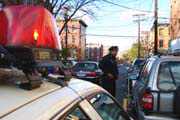If you are going to drive on city streets this week, be sure to grab your seatbelt and fasten it across your body. Otherwise Jersey City Police Officers are likely to see you, pull you over and issue you a $42 summons.
They probably will also give you an informational flyer that describes the dangers of not wearing your seatbelt.
This comes from the Jersey City Police Department’s “Click It or Ticket” campaign, an aggressive enforcement and education initiative intended to let city drivers know that they need to buckle up or else.
Part of a statewide campaign that happens every holiday season, this current round targets all residents but places a special emphasis on certain demographic groups whose members are more likely to die in a traffic accident than any other age or ethnic group.
“Teens and young adults are killed at far higher rates in crashes because they are caught in a lethal intersection of inexperience, risk taking and low safety belt use,” Mayor Glenn Cunningham said in a release. “These tragedies are predictable and therefore preventable, using proven techniques like high-visibility enforcement mobilizations.”
According to the National Highway Traffic Safety Administration [NHTSA], more people are killed each year in traffic crashes – 42,850 in 2002 – than have been lost through acts of violence, terrorism and most deadly diseases.
If the public is not educated about the hazards of not buckling up, the police department warns, it is predicted that 50,000 more people will lose their lives in auto collisions by the year 2008.
Fatality rates for teens are twice that of older drivers, and the risk of crashes for teens is four times that of older drivers. Forty percent of deaths among teens are the result of a traffic crash.
“While national seat belt use is at an all time high of 79 percent, we know the remaining 21 percent who don’t wear their seat belts are disproportionately teens and young men ages 18 to 34,” Police Chief Ronald Buonocore said in a release.
The campaign will be enforced through random checkpoints at heavily trafficked areas throughout the city, JCPD Sergeant Edgar Martinez said last week.
“The only way people learn is through issuing a summons,” Martinez said. “And we issue the flyer as a reminder to buckle up. This is the law. Hopefully they adhere to it.”
Added Martinez, “We hope people get the idea that it’s saving their life. Just put the little strap on. So many officers who do this enforcement get people who ask them if it really works. And we say, ‘Yes, it works! Your head won’t go through the windshield.’ ”
Danger to ethnic, racial groups
Recently-issued statistics by both public transportation agencies and private educational institutions also paint a disturbing picture.
The police department said in a release that a 1999 study by Meharry College, a historically black medical institution, reported that 100 percent seatbelt use among African-Americans could save 1,300 lives and prevent 26,000 injuries each year.
Also cited in the release was a study by the National Highway and Traffic Safety Administration [NHTSA] that suggests motor vehicle crashes are the leading cause of death for Hispanics from one to 44 years of age and are the fifth leading cause of death of Hispanics for all ages.
Convincing Hispanics to increase their use of seat belts will help reverse this trend, officials said, and city agencies are using information from a recent NHTSA medical study that found that although African-American and Hispanic male teenagers travel fewer vehicle miles than their Caucasian counterparts, they are nearly twice as likely to die in a motor vehicle crash.
According to U.S. Census data from 2000, 30 percent of Jersey City’s population is made up of African Americans while another 30 percent are made up of people Hispanic origin.
The police department is hoping to reach their black and Hispanic audience through both the “Click It or Ticket” campaign and outreach from community groups and churches. The mayor also visits schools to talk to teenagers about the benefits of using a seatbelt.
Although many people who don’t regularly wear seatbelts can’t help but grumble at being ticketed and forced to do something they’d rather not, there’s proof that enforcement campaigns like these work. The NHTSA estimates that over 13,300 lives were saved by belt use last year due to this aggressive enforcement of seatbelt laws.
“It’s not about police giving tickets,” Martinez said. “It’s about saving lives. It’ll save your life and your kids lives, too.”
